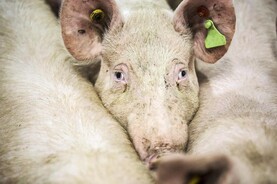Between January and September 2014, Russia banned imports of live pigs, fresh pork and other pig products from the entire EU, following an African swine flu outbreak in Latvia. The ban was declared as the Ukrainian crisis flared up between political forces aligned with Russia and those favouring closer relations with the EU. As war erupted between the two camps during the first half of 2014 and Russia annexed the Ukrainian region of Crimea, Moscow hardened economic sanctions against Western countries, resulting in the
wider ban on European agricultural products in place for the past two years.
Between January and September 2014, Russia banned imports of live pigs, fresh pork and other pig products from the entire EU, following an African swine flu outbreak in Latvia.
The ban was declared as the Ukrainian crisis flared up between political forces aligned with Russia and those favouring closer relations with the EU. As war erupted between the two camps during the first half of 2014 and Russia annexed the Ukrainian region of Crimea, Moscow hardened economic sanctions against Western countries, resulting in the wider ban on European agricultural products in place for the past two years.
This Friday, the World Trade Organisation found that the initial pork ban did not comply with trade rules agreed by its members on sanitary and phytosanitary (SPS) measures.
Russia did not base the measures at issue on a risk assessment within the meaning of the SPS Agreement
A panel appointed to resolve the dispute between the EU and Russia ruled that “Russia did not base the measures at issue on a risk assessment within the meaning of the SPS Agreement”. Those measures “arbitrarily and unjustifiably discriminate between members where identical or similar conditions prevail,” the panel added.
In deciding that pig products from the entire EU posed an African swine fever risk, Russia “did not conform” to the standards set by the World Organisation for Animal Health, the decision reads.
In addition, “Russia required information that was not limited to what is necessary for the procedure at issue”. When it did receive information from the EU, it “completed the procedure with undue delay”.
At most, the WTO found that the EU had failed to provide evidence of which areas within Latvia were free from African swine fever.
WTO procedures to continue
In a statement issued on Friday, the European Commission commented: “For most of the products dealt with in this case, trade continues to be restricted by a politically motivated ban imposed on EU agri-food products by Russia in August 2014. Nevertheless, the panel’s findings are of systemic importance, since they remind Russia about its international obligations and the fact that these cannot be arbitrarily ignored.”
The Commission added that it would continue to use WTO procedures to tackle trade barriers with Russia.
The current ban covers a wide range of European food products and is widely seen as having contributed to the dairy and pig income crisis of the past year.
Read more
Russia officially extends Western food ban until 2018
Everything working in favour of pig industry, except price





SHARING OPTIONS: